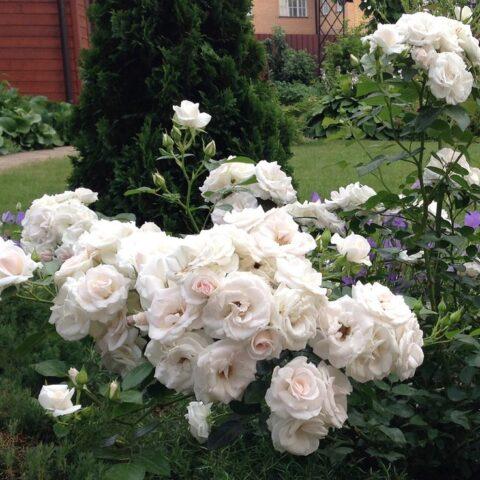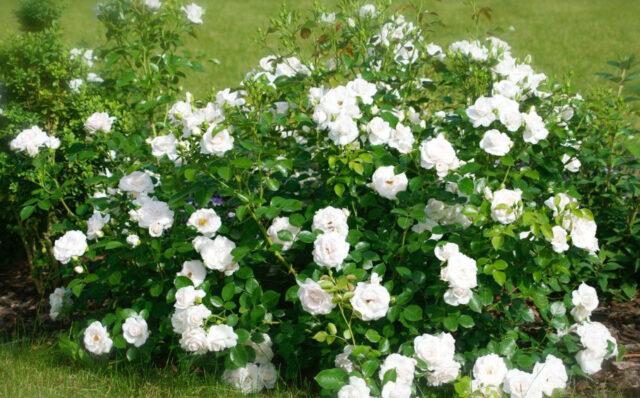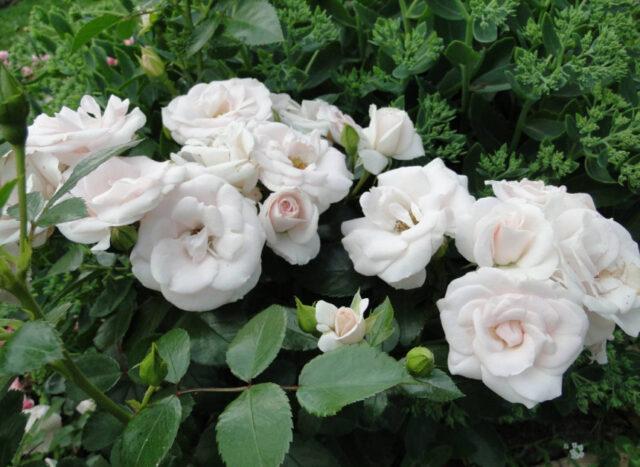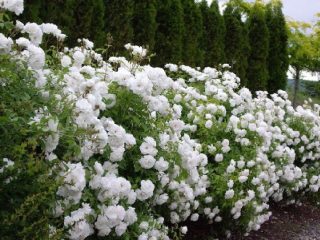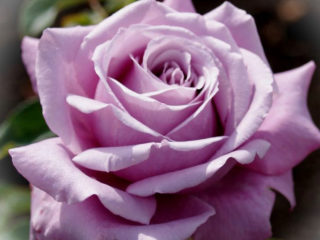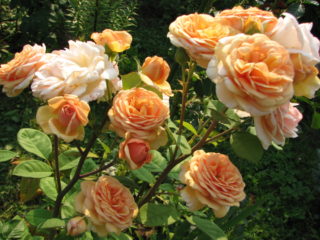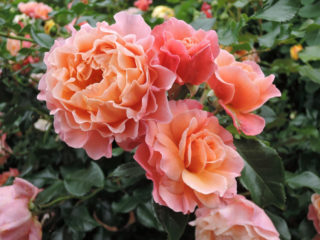Content
- 1 History of selection
- 2 Description and characteristics of the floribunda rose variety Aspirin
- 3 Advantages and disadvantages of the variety
- 4 Reproduction methods
- 5 Planting and caring for roses Aspirin
- 6 Pests and diseases
- 7 Rose aspirin in design
- 8 Conclusion
- 9 Reviews with photos about floribunda rose Aspirin Rose
Rose Aspirin is a versatile flower that can be grown as a patio, ground cover or floribunda. Suitable for flower beds, containers, group and single plantings, does not wither for a long time when cut. It blooms with white and pinkish buds for a long time and abundantly. The flowers densely cover the bushes in large tassels and look elegant and delicate. Aspirin is inferior to its relatives in size, but does not lose in the richness and splendor of flowering.
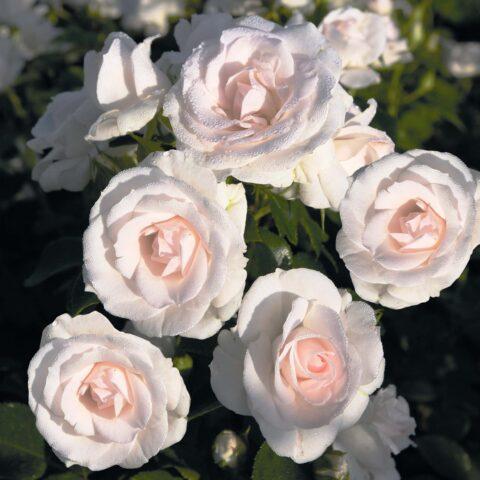
Aspirin Rose blooms profusely and continuously, covering the entire bush with lush buds
History of selection
Floribunda rose Aspirin Rose was developed by Tantau in Germany twenty-three years ago. The author of the selection is Hans Jürgen Evers. The plant received its name in honor of a common drug, as it appeared on the centennial anniversary of the drug. It is also known that in 1996 the variety received an ADR certificate.
Description and characteristics of the floribunda rose variety Aspirin
Aspirin Rose belongs to the category of ground cover or climbing miniature roses. It fits perfectly into both small cozy front gardens and large landscape compositions. It is considered the easiest and easiest variety to grow. Ideal for beginners.
The rose bush blooms profusely, all the buds bloom almost simultaneously, and new ones appear after the fallen inflorescences. Flowering is repeated and prolonged, occurring over four to five months. The budding period lasts from the beginning of June to the end of October.
Aspirin Rose flowers are lush, beautiful, have different sizes, some can reach 80 mm in diameter, and grow close to each other. The core of the inflorescence is hidden because the petals are packed tightly. The buds are similar to a classic rose, cup-shaped, white. When they begin to bloom, they have a soft pink tint in the center; if the weather is cool, it is more pronounced. When the buds open completely, their color becomes snow-white, and a weak but very pleasant aroma appears. The foliage of Aspirin Rose is small, smooth, without jagged edges, with a glossy surface. It has a rich dark green color and an oval shape.
The perennial bushes are spreading, beautifully shaped, growing in width more than in height (0.8 and 0.5 m), the shoots are thin. Each brush can produce up to 15 densely double buds, which gives the impression that the rose is completely covered with flowers. Each inflorescence of Aspirin Rose has about fifty petals, which have one distinctive feature: they begin to fall off until they lose color. For this reason, the plant always looks neat and tidy.
Another significant advantage of Rose Aspirin is that it has good immunity; with proper care and cultivation in a suitable place, it is resistant to almost all diseases common among roses - such as black spot and powdery mildew. In addition, it feels great during unfavorable weather conditions and easily tolerates winter (the frost resistance zone of the variety is fifth).
Advantages and disadvantages of the variety
This variety of floribunda has a number of advantages and disadvantages.
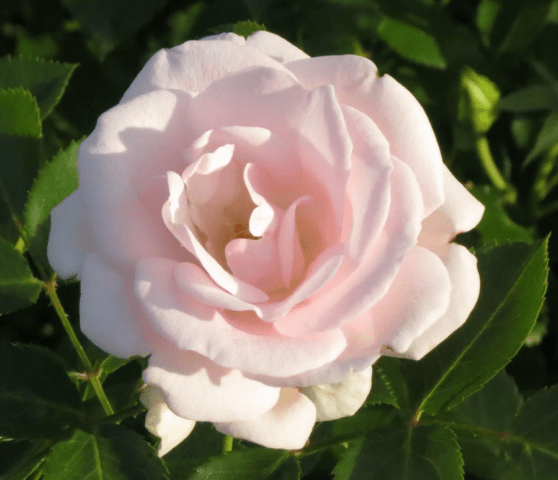
The color of rose buds may change depending on temperature and lighting
The main advantages of Aspirin Rose include:
- continuous long flowering;
- lush buds and densely leafy bushes;
- persistent immunity to diseases;
- good frost resistance;
- versatility in use;
- suitability for cutting.
The disadvantages of the variety are:
- subtle odor;
- inconvenience of processing the area around the bush.
Reproduction methods
The Aspirin Rose rose bush can only reproduce vegetatively. As a rule, most gardeners use the cutting method, which is carried out after the first flowering, in June. To do this, cut off a shoot 10 cm long, 10 mm under the bud and 20 mm from the eye. Then it is placed in a growth stimulator for several minutes and planted in fertile soil. In about three weeks, the cutting will take root, and next year it will be ready for planting in a permanent place.
Bushes with strong and long shoots are propagated by layering; they are placed in shallow grooves, covered with earth, and watered as necessary. When leaves appear on the seedlings, they are separated from the bush and planted in a flower bed.
Propagation by division is carried out in the spring, and only when the rose is more than four years old.
Planting and caring for roses Aspirin
In regions with warm winters, it is better to plant the ground cover rose Aspirin Rose in the fall, in regions with cold winters, in the spring. In the first case, the seedlings are shortened by 15 cm before planting, in the second - by 20-25 cm. For strong cuttings, three buds are left, for weak ones - one or two. The best place to plant a crop is on a hill where melt water and moisture do not stagnate. The area must have fertile soil; before planting, it should be cleared of weeds, loosened and treated with Roundup. After this, you need to dig a small hole 30 cm deep, lay crushed stone, manure, peat, sand on its bottom, place the cutting, cover it with earth and water it.
Throughout the season, standard care for Aspirin Rose is recommended:
- Watering should be carried out early in the morning or in the evening, when the soil under the bush dries 2-3 cm deep.
- The Aspirin rose should be fertilized at least four times during the growing season: during the formation of leaves, thirty days later, at the end of the first wave of flowering, before the onset of winter.Attention! The first three feedings should be carried out with nitrogen, potassium, phosphorus in a ratio of 1: 1: 2, during the last, it is advisable to add K.
- It is recommended to prune this variety twice a year - in spring and autumn. After winter, you need to cut off all shoots damaged by the cold at the roots, and before the onset of frost, shorten infected and overgrown branches by 20 cm.
- Cover the plant with special material or spruce branches, but only if it grows in a region with severe frosts (-28 0C and below).Comment! Aspirin Rose densely covers the flowerbed with flexible shoots, so you should loosen the soil and remove weeds in the spring, before intensive growth begins.
For abundant flowering, the plant requires balanced and properly selected fertilizers.
Pests and diseases
Aspirin Rose is a variety with very high resistance to many diseases. Those ailments that are rare, but likely to be encountered when growing roses include:
- black spot;
- powdery mildew;
- rust (in contaminated areas).
Usually a plant gets sick only if it is not cared for at all. If an “infection” is detected, the perennial should be immediately treated with Actellik or Intra-Vir.
The variety is rarely affected by insects. When pests attack, it is enough to spray the bush with insecticides.
Rose aspirin in design
In the garden, Aspirin Rose looks great. It can be used in any landscape design, since it represents a combination of three types at once: patio, ground cover, floribunda.
The plant looks interesting when planting several bushes side by side, when the falling branches, covering the soil, form a solid green carpet with white flowers. Since the rose is miniature, it looks great in pots and vases. Many gardeners plant Aspirin as a floribunda in group flower beds and mixborders. Its buds are best combined with flowers in yellow, blue, red and purple shades.
The variety is well suited for cutting and looks great in compositions. In a vase with water, a bouquet of Aspirin Rose can last longer than a week.

Flowers of this variety of rose are suitable for making bouquets and compositions
Conclusion
Rose Aspirin is a variety with good health, high resistance and special external characteristics. With proper care, the perennial annually pleases its owner with high-quality, abundant and long-lasting flowering. The buds of miniature Aspirin Rose are lush and beautiful, exuding a faint but very pleasant aroma. The variety is excellent for beginning amateur gardeners.
